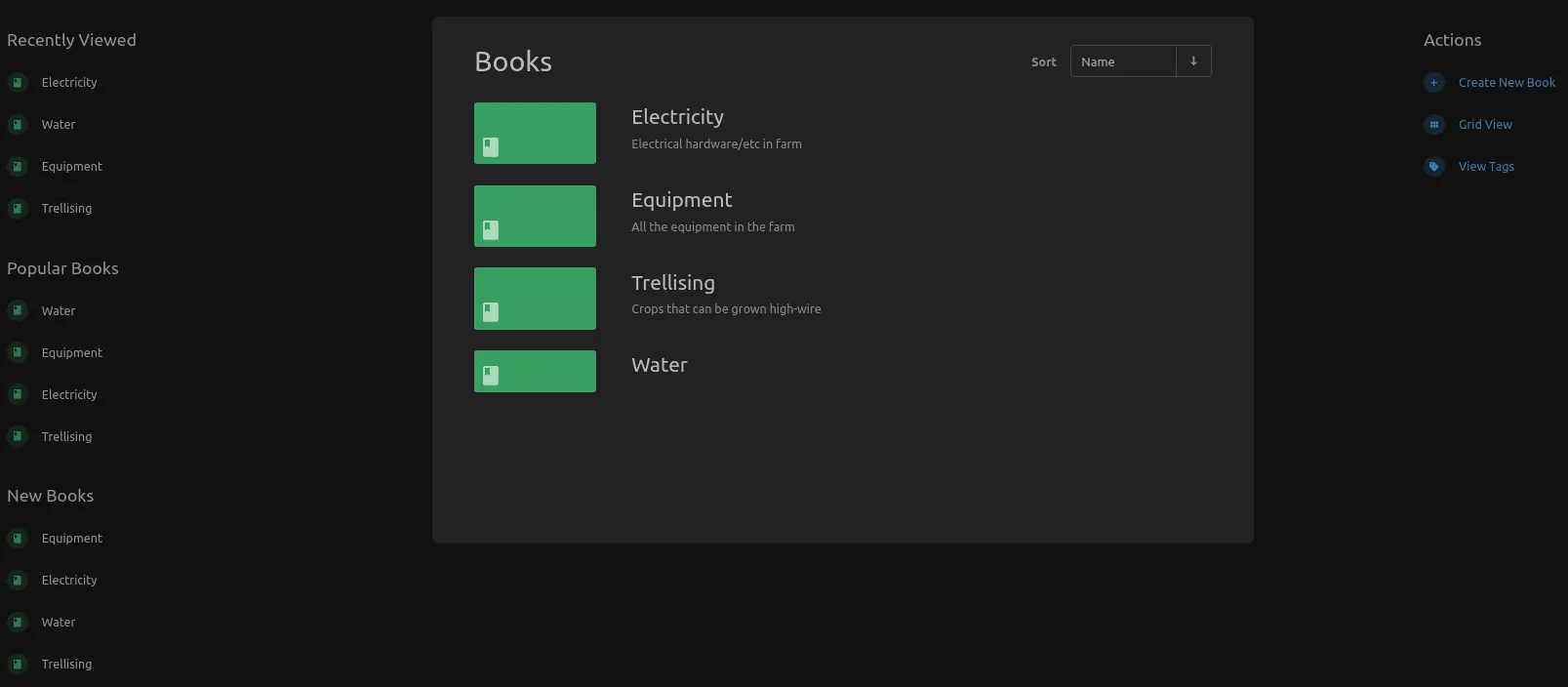I have a bookstack instance self-hosted and I quick like the program and workflow. I like having ‘books’ of information to separate/organize my information. It feels very much like folder heirarchy to me, and while that has its issues, I prefer it. Being able to add tags to pages helps alleviate some of those issues and helps with a broad search for an idea when I don’t know where it is stored down the line. Here is a quick view of my bookstack. It’s nothing fancy, but a visual to see what I’m talking about.

It’s great software. But I am very fond of software designed to be readable in 100 years. Meaning that the file does not require the program to be read. Text files (.txt, .rtf, .odt) are formats that are designed to be read in the future without MS Word, or Notepad; .doc, .docx, etc without microsoft might not be readable in 100 years without having MS software. That is why I like taking notes with markdown and why I like software like QownNotes, obsidian, and logsec which produce files that are readable without the program. So if they crash and burn, I don’t lose my data. With Bookstack, I cannot view that data without bookstack. And if I wanted to move my documents to a different software, I cannot export everything. I can export page-by-page but that’s only reasonble on a small scale. So, while I like the program, I would like to move to another program for my wiki/personal knowledge base.
For those wondering why I am worried about this: I’ve run into many walls with software problems in my life:
- software I use being abandoned
- new terms of service I don not agree with blocking me from using the program I like
- price hikes for software I use that are not worth it but I’m vendor locked and so I have to either pay or go the tedious route of moving my data slowly over because there is no export possibilities. 4)I am using a new device and I can’t access or view my data because the software doesn’t work on the device, hasn’t been ported over, or isn’t usable on the novel form factor of the device.
My worries with bookstack flow from there. It may be a good program, but what if my needs change, can I move my data easily?
In my search, Tiddlywiki was a standout in this view because it is a quine. It contains all its code to run/display itself (it’s a quine). So in 100 years, you should be able to open a tiddlywiki and it will contain be able to be read. However, I am having a hard time adapting to tiddlywiki’s way of doing things. Far less user friendly than Bookstack in ease of use. Thus I am writing this post to see if anyone else has ideas. Is there a way to make tiddlywiki look/work more like Bookstack in the book→pages (or folder→files) workflow? Or do you know of another piece of software for a knowledge base that meets the ideas above?


OP mentioned TiddlyWiki, which I think is a good option if you’re wanting to keep everything together and in a pretty longlasting format, plus there’s a small but creative community that’s made all kinds of interesting plugins for it.
However, if you’re looking for something very small and similarly flexible, there’s also Feather Wiki. Outside of these two, another person already mentioned it but there’s Zim, which may feel a little more comfortable to use as it’s separate desktop software from your browser.
I’ve not made anything with Feather Wiki, but I’ve dabbled with TiddlyWiki and Zim and liked both for different reasons. TW for possibility of sharing/publishing in a nice looking format, and Zim for linking together different offline notes and files (it can also export to bare html which you may then make look nicer with some CSS).
Lastly there’s also Zettlr that I’ve only just started playing around with. I think it may work a little better than Zim in terms of handling offline note sorting and linking files, but I’m not sure yet.